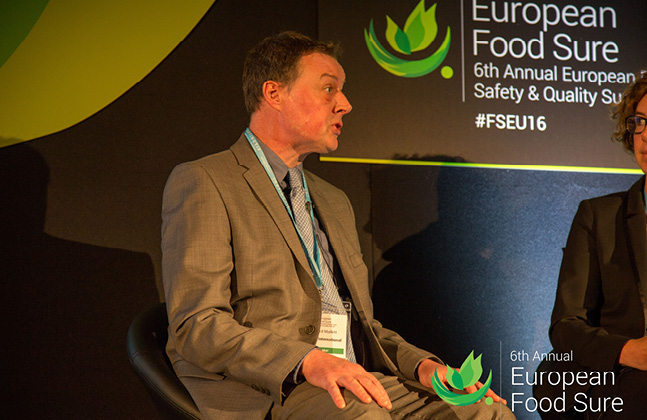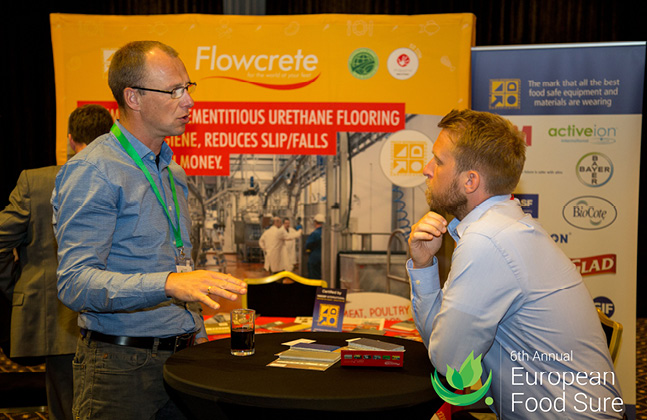Flowcrete UK participated in the 6th Annual European Food Safety & Quality Summit in Amsterdam, Netherlands, alongside HACCP International, to discuss with leading food and beverage businesses about specifying building materials that will create a hygienic production environment.
Flowcrete UK’s Exports Manager Ian Jones attended the event with HACCP International EMEA’s Managing Director Richard Mallet, who took part in a panel discussion at the summit to provide insights into upcoming changes and best practice food safety regulatory compliance. During the discussion, the summit’s attendees learnt how to prepare a successful strategy to meet HACCP requirements as well as how to effectively navigate the HACCP International certification process.
We’ve included a summary of some of the points outlined at the food safety summit below to give you an idea of what HACCP is and why it is becoming increasingly important.
What is HACCP?
HACCP stands for Hazard Analysis and Critical Control Point and it is a food safety management system that provides food and beverage facility designers, owners and plant managers with a list of parameters for building materials and operational activities to minimise the risk of food contamination incidents.
Rather than relying on end testing to trace a contamination back to its source, HACCP is centred upon the principles of prevention. The guidelines cover the entire food manufacturing process, from harvesting to consumption.
Ensuring that facilities are HACCP compliant is very important to today’s food and beverage sector, as it is central to meeting strict industry regulations as well as to assuring consumers around the world that the highest hygiene standards have been taken into account during each stage of the foodstuff’s lifecycle.
What is HACCP International?
HACCP International operates a globally recognised product certification scheme that evaluates materials, equipment and services used within the food industry to identify food safety hazards and appropriate controls in order to reduce the risk of food contamination from those materials.
What are HACCP’s Flooring Guidelines?
The HACCP guidelines emphasise the importance of seamless and impervious flooring, as seams, joints, grout lines and gaps can become breeding sites for bacteria, fungi, mould and mildew. Seamless surfaces help to quickly wash unwanted substances out of the area. It is important to ensure that the floor is able to maintain these properties, as otherwise its seamlessness or imperviousness could be compromised.
The HACCP standard requires adequate drainage and cleaning in order to facilitate the fast and effective removal of excess liquid and contaminants. Easily cleanable stainless steel drainage should be incorporated into the floor plan and the floor needs to be sloped to the drains to avoid water pooling and to ensure that waste liquid flows in the right direction.
Which Floors Meet HACCP’s Standards?
To meet HACCP’s guidelines, an exposed concrete slab needs to be covered with a high performance flooring system in areas where consumable food and beverage products are being produced, processed, packaged or stored.
Traditional food and beverage flooring materials such as terrazzo, epoxy resins and polyurethanes meet HACCP’s criteria thanks to the seamless, non-absorbent and easy-to-clean finish that they create (however this does not mean that all of such materials are HACCP International certified).
Seamless resin-based surfaces are increasingly being specified on account of the material’s hygienic profile and hardwearing performance characteristics. Thick polyurethane systems are especially applicable, as they can withstand conditions such as heavy impacts, corrosive substances, foot traffic and thermal shock for an extended period of time.
Flowcrete UK’s Flowfresh range has been HACCP International certified thanks to its ability to retain a seamless, easy to clean surface within even the busiest, most intense food and beverage production facilities. Thanks to the inclusion of an antimicrobial additive, Flowfresh also meets the ISO 22196 standard, which measures a surface’s antibacterial effectiveness.
Want to Know More?
You can find more information on the Flowfresh range and how it can assist brands operating a HACCP based Food Management System by clicking here or by contacting Flowcrete UK’s flooring experts.









